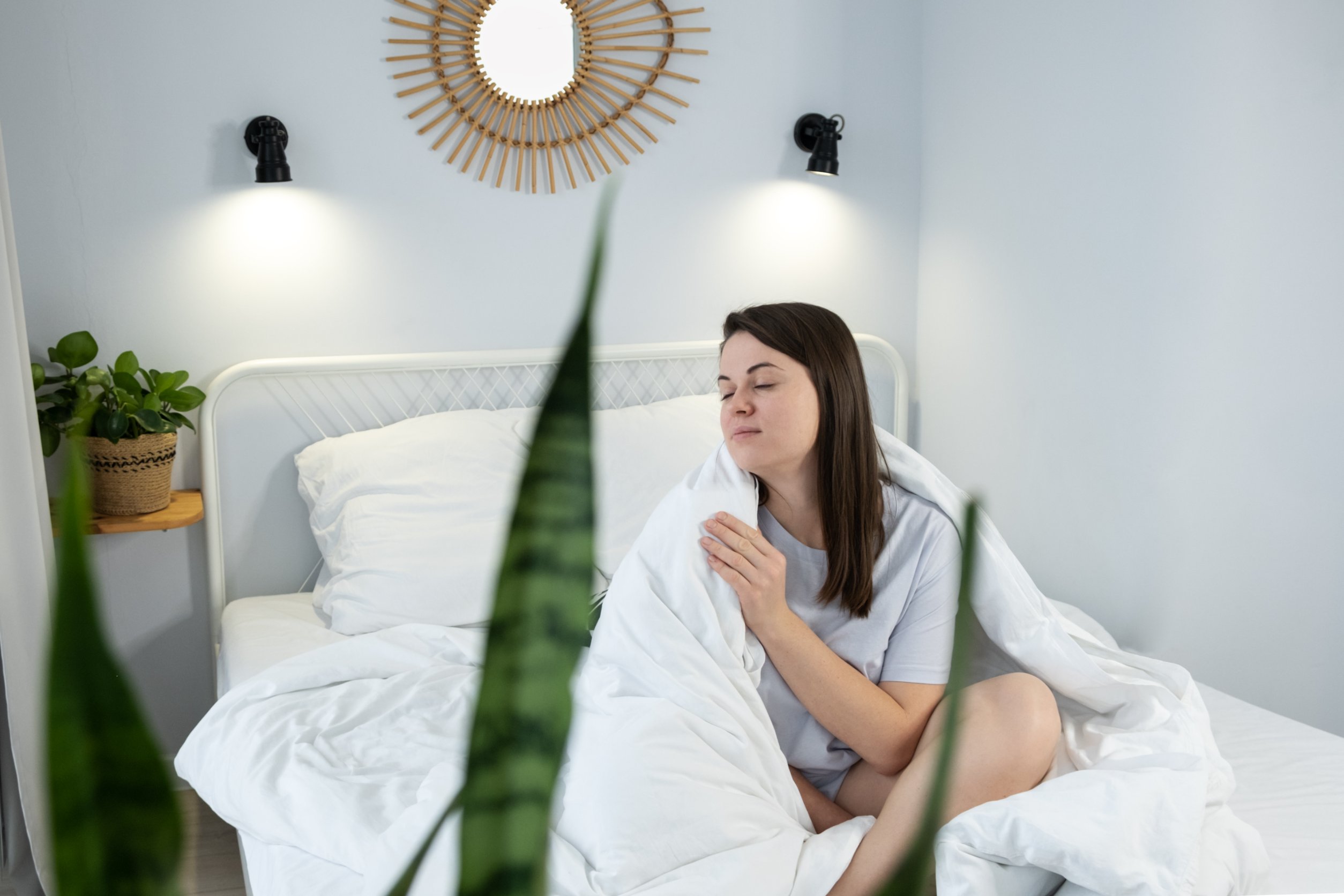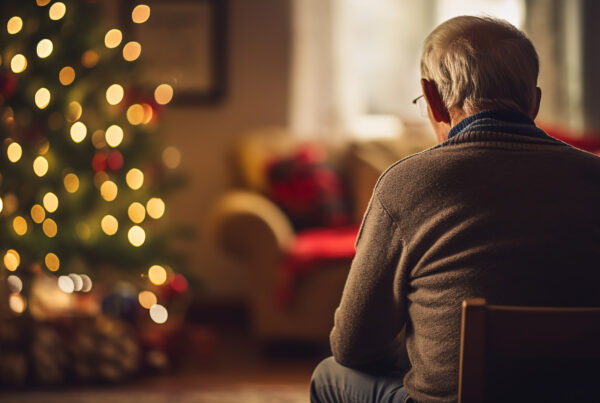”Question: I have really bad anxiety and it is preventing me from sleeping. Any quick tips?
Reading Time: 6 Minutes
MWi Hack:
- Learn about how anxiety affects sleep and how you can regain control over your sleep.
MWi Summary:
- Anxiety is common at night because there can be more opportunities to worry at night.
- Anxiety disorders and sleep have a bidirectional connection.
- You can manage anxiety at night with the following:
- Control your breath
- Write down your worries
- Maintain a bedtime routine
- Try to focus your mental energy
- Create a comfortable sleep environment
Anxiety at night is common. If you find it difficult to sleep, there are ways to manage anxiety and get a restful night’s sleep.
If you’re lying in bed feeling anxious, chances are you might have a hard time falling or staying asleep.
If this tossing and turning are becoming a nightly routine, you’re not alone. More than 40 million people in the United States have a long-term sleep disorder.
Getting a good night’s sleep is essential to feeling your best. But, when you’re begging your brain to stop fixating on unwanted thoughts, it can feel overwhelming and cause anxiety.
There are ways you can manage anxiety at night to help you get better rest.
Why is anxiety common at night?
Anxiety can be common at night because nighttime is the only time of day when things are quiet, the demands of the day start to slow down, and our opportunities to worry start to increase, says Annia Palacios, a licensed professional counselor in Texas and Florida.
“These ruminating thoughts contribute to difficulty falling and staying asleep,” she says.
Correlation between anxiety and sleep
Anxiety may play a major role in how well you sleep, according to a 2013 review of research. If you’re prone to anxiety, you may find it hard to sleep at night. If you’re having a hard time sleeping, you may start to get anxiety.
The research acknowledged that various studies found a bidirectional relationship between sleep and anxiety, which means either disorder can come first. However, more research is needed to verify this.
An older 2003 review of studies indicates that anxiety and sleep problems both contribute to one another, which in turn produces anxiety symptoms as well as sleep loss.
A more recent 2019 paper found that people with insomnia symptoms are vulnerable to anxiety during times of stress.
Can anxiety cause insomnia?
Sleep disturbances are often a symptom of many anxiety-related disorders, including generalized anxiety disorder (GAD) and post-traumatic stress disorder (PTSD).
A 2020 review of studies on sleep disturbance in PTSD and anxiety disorders found that there’s a bidirectional connection between sleep problems and anxiety. This means that sleep disturbances can lead to anxiety, and anxiety can lead to sleep deprivation.
People who have an anxiety disorder often have constant sleep-wake difficulties, which can present in the form of insomnia.
An older 2003 review found that 24% to 36% of people with insomnia also experience anxiety.
How to manage anxiety at night
To help you manage anxiety at night and sleep more soundly, there are a few things you can try before you go to bed:
- Control your breathing.
- Write down your worries.
- Maintain a nightly schedule.
- Try to focus your mental energy.
- Create a comfortable environment.
1. Control your breath
“One of the best ways to activate a sense of calm is through breathwork,” says Martamaria Hamilton, a licensed professional counselor and founder of TeleWellness Hub who lives in El Paso, Texas.
By controlling your breath, you’re activating the “rest and digest” response, which is the opposite of the fight-or-flight response, Hamilton says.
“Breathwork, including diaphragmatic (belly) breathing, is one of the most important and impactful ways to activate the vagus nerve and trigger relaxation in the body, and quickly,” Hamilton explains.
2. Write down your worries
Palacios suggests writing down your worries before you get into bed each night. “Ruminating thoughts happen because we continue to go over and over things in our minds,” she says.
Writing down our worries and to-do’s can help free up some space in our minds, Palacios says.
“Writing one’s anxious thoughts down is an excellent way to disconnect from them,” says Po-Chang Hsu, a physician and medical content expert at SleepingOcean, a website that reviews sleep products. “Many people also find the process itself soothing, which may help them wind down and sleep better.”
You can try starting a nightly journal where you write down your thoughts each night before you go to sleep.
3. Maintain a bedtime routine
You can create good sleep habits by maintaining a regular sleep schedule. If you can, try to wake up and go to bed at the same time every night — even on the weekends.
“Try to avoid stimulating activities like watching TV and scrolling social media,” Palacios says, because “stimulation like TV and our phones can make it even harder to fall asleep.”
Also, try to avoid caffeine and nicotine. These are stimulants that can not only make you feel anxious but can also keep you awake.
You can try incorporating things into your routine that help you slow down, such as reading a book or listening to soothing music.
4. Try to focus your mental energy
In order to stop anxious and racing thoughts, try to focus your mental energy on something that you can imagine or something that you can see or hear in your bedroom, says Chloe Sica, a licensed psychologist in New Jersey and New York.
Sica suggests focusing on “the white noise of a sound machine or a visual image that you find soothing, such as the crashing waves on a beach or the wind blowing the trees.”
If you feel anxious or like you can’t sleep, try getting up and gently moving — such as walking around or stretching — until you feel tired. It’s important to avoid watching TV or using screens.
5. Create a comfortable sleep environment
Maintaining a comfortable sleep environment often means using your sleep space or bedroom only for rest and intimacy, such as sleep and sex. Try not to do things in your bedroom or bed that might shift your focus from rest, such as watching TV or working on a computer.
Try sleeping in a cool, dark space that’s free from any noises or distractions. Make sure your mattress and pillows are comfortable and supportive, too.
Consider sleeping with a weighted blanket.
“Sleeping under a weighted blanket feels like a deep hug, which is incredibly relaxing for most people,” Hsu says. “This simple tool is proven to ease anxiety thanks to the deep pressure therapy such blankets provide.”
Medical treatment options for sleep and anxiety
Treatment options are available for both insomnia and anxiety. These options include:
- Medication. Medications such as selective serotonin reuptake inhibitors (SSRIs) or benzodiazepines (BZDs) can help treat anxiety and may address underlying causes of insomnia.
- Herbal remedies. Melatonin or valerian root may help.
- Cognitive behavioral therapy (CBT). This type of therapy can help you change behaviors that keep you awake.
- Mindfulness and relaxation techniques. Meditation, yoga, exercise, and massage therapy can improve anxiety and sleep.
- Light therapy. Artificial light may help improve mood and quality of sleep.
- Sleep restraint. This therapy decreases the amount of time a person is in bed.
To treat both sleep problems and anxiety, healthcare professionals may recommend a combination of medication and therapy.
Let’s recap
Anxiety at night is common because it’s the time of day when things start to slow down and get quiet. For some people, this is when worries increase.
Various studies have found a bidirectional relationship between sleep and anxiety, meaning they both contribute to one another.
If you’re prone to anxiety, you may find it difficult to sleep at night. And if you’re having a hard time sleeping, you may also get anxiety.
Studies have also found that if you have insomnia, you have an increased risk of having anxiety.
If you find it difficult to get sleep due to anxiety, you can:
- practice controlling your breathing
- write down your thoughts and worries
- create a nightly bedtime routine
- learn to focus your mental energy
- create a cozy, comfortable sleep environment
Anxiety at night is manageable and treatable. If you think you have an anxiety disorder or a sleep disorder, a mental health professional or a sleep clinic specialist can help you.
MWi would like to thank Janelle Cox, for her expert insights that we were able to share with our community. Click the button below to read the original article:






